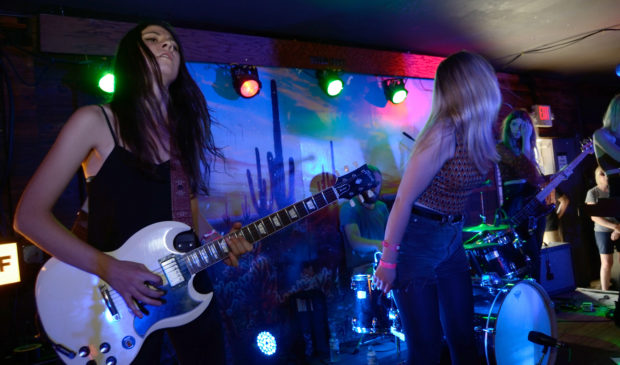Music advocates push for portion of possible hotel tax increase
Thursday, June 20, 2019 by
Chad Swiatecki Local groups organized around improving the financial standing of Austin musicians are preparing to push city leaders to dedicate funds from the proposed expansion of the Austin Convention Center toward the city’s commercial music industry.
The groups include Music Moves Austin, the Music Venue Alliance and members of the Red River Cultural District. Their initial projections say around $3 million per year from the city’s portion of the Hotel Occupancy Tax could help subsidize touring musicians and reimburse Austin clubs for booking local acts.
That consortium is expected to begin a coordinated campaign, including meetings with City Council members in the coming months, in part to sway thinking on how the hotel tax funds have been used historically.
At issue is the long-standing practice of spending hotel tax funds allotted for arts uses – capped by state law at 15 percent of the total annual intake – only on nonprofit groups. While not a legal requirement at the city or state level, that practice has kept a reliable source of money out of the coffers of music venues, festivals, musicians and other pieces of the city’s music economy and instead directed the funds toward cultural arts groups.
Rebecca Reynolds, executive director of the Music Venue Alliance, said the tradition of allocating funds only to nonprofit groups has been in place long enough to act like a legal requirement.
“I had labored under the belief all along that the city had passed an ordinance requiring a nonprofit status, and that’s not even true,” she said, adding that she learned of the misconception this spring. Now, she said, “we realize that time is of the essence. I think that there’s some education that needs to happen.”
Rather than pushing to take existing funding away from arts groups that have received hotel tax funds in some form for years, Reynolds said her group and others will support the convention center expansion if the arts funding from an expected increase in hotel tax receipts is steered toward the music industry. That increase would come from a 2 percentage point hike on the hotel tax levy to pay for the convention center, 15 percent of which could be spent on arts uses that promote tourism per state law.
“It is my belief, after reading the state statute and the city code, that the current strategy for allocating Hotel Occupancy Tax funds in Austin frustrates the purpose of state Chapter 351, which is the statute that spells out how you can use HOT funds,” she said. “The intended target of 351 is the primary drivers of tourism. In Austin our primary driver of tourism is clearly and verifiably music. By creating this ‘tradition’ that the money must go to nonprofits, what (the city) has done is disqualified the stated target of Chapter 351 because our primary driver of tourism is not a nonprofit, it’s music.”
Reynolds said if the allocation model is changed to include commercial music, she and other music advocates would want the city to hold public forums on the best way to deploy that money. She said most members of her organization would prefer to see a needs-based model rather than steering tax dollars to large, profitable festivals and businesses.
Including the music industry as a recipient of the city’s hotel tax funds, which annually exceed $100 million, was one of the recommendations of the Visitors Impact Task Force, a group that met through much of 2017 to study the best ways to use hotel tax receipts throughout the community.
Mayor Steve Adler said he sees the extra arts revenue generated by the funding mechanisms for the convention center expansion as a way to end a funding turf war between music and cultural arts groups that has been ongoing for more than 20 years.
“I’m excited because as part of the task force process we saw representatives from cultural arts and music working through that issue, and the solution works so long as we are able to increase the size of the pie for arts funding as part of the convention center expansion,” he said. “Additional funds for the arts should be devoted to the music industry, and I’m glad to see that after 20 years, the two groups are getting on the same page.”
Photo by MarkScottAustinTX made available through a Creative Commons license.
The Austin Monitor’s work is made possible by donations from the community. Though our reporting covers donors from time to time, we are careful to keep business and editorial efforts separate while maintaining transparency. A complete list of donors is available here, and our code of ethics is explained here.
You're a community leader
And we’re honored you look to us for serious, in-depth news. You know a strong community needs local and dedicated watchdog reporting. We’re here for you and that won’t change. Now will you take the powerful next step and support our nonprofit news organization?






